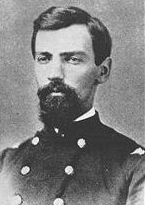Rufus Dawes
Rufus R. Dawes (July 4, 1838 – August 1, 1899) was a military officer in the
Civil War
Having migrated to Wisconsin prior to the outbreak of the Civil War,[2] Dawes organized a volunteer company from Juneau County in May, was elected Captain, and appointed as such by the State on May 5, and on July 16, 1861, his Company K was mustered into the 6th Wisconsin Volunteer Infantry for three years service. The regiment served for almost a year in Northern Virginia without seeing major action. In June 1862, Dawes was promoted to major. He served with his regiment at the Second Battle of Bull Run, South Mountain, Antietam, and Fredericksburg. He was in command of the regiment for most of the Battle of Antietam after Lt. Colonel Edward S. Bragg was shot and injured. In March 1863, Dawes received a promotion to the rank of lieutenant colonel and served in the Chancellorsville Campaign, leading a river crossing under fire at Fitzhugh's Crossing on April 29.[3]
During the
On February 24, 1866, President Andrew Johnson nominated Dawes for appointment to the grade of brevet brigadier general of volunteers to rank from March 13, 1865, and the United States Senate confirmed the appointment on April 10, 1866.[4][5]
After the war, Dawes became a Companion of the Ohio Commandery of the Military Order of the Loyal Legion of the United States.
Some of Dawes' letters are available to researchers.[6] From his time in the Civil War, Dawes likely suffered from post-traumatic stress disorder, although he was able to cope with the symptoms.[7]
After the war
Dawes returned home to Marietta, Ohio and entered the lumber business. In August of that year, his son
Dawes also served on the Board of Trustees of Marietta College from 1871 until his death, 28 years later. He was also a
Death and burial
Dawes died two years later, August 1, 1899, in Marietta, Ohio, and was buried in Oak Grove Cemetery, Marietta.[2][5]
Legacy
Dawes was elected to Marietta College's Hall of Honor in 2003.
See also
- List of American Civil War brevet generals (Union)
- William T. Sherman
Notes
- ^ Ferris, Mary Walton. "Dawes – Gates Ancestral Lines, Vol. I and II", privately printed 1943.
- ^ ISBN 0-8047-3641-3. p. 204.
- ISBN 978-1-4575-6431-4) pp. 76–85, 88–124, and 234–239.
- ^ Eicher, 2001, p. 743.
- ^ ISBN 1-56013-002-4. p. 151.
- ^ [1] Archived February 3, 2010, at the Wayback Machine
- ISBN 978-3-515-07687-6. Retrieved July 12, 2012. p. 423.
- ^ Sortland, R. A. (1958). Charles G. Dawes: Businessman in Politics. Unpublished manuscript, University of Cincinnati, Cincinnati, OH. p. 4.
References
- Dawes, Rufus R. A Full Blown Yankee of the Iron Brigade: Service with the Sixth Wisconsin Volunteers. Lincoln: University of Nebraska Press, 1999. ISBN 0-8032-6618-9. First published 1890 by E. R. Alderman and Sons.
- Dawes, Rufus Robinson (1890). Service with the Sixth Wisconsin Volunteers {original publication}. Marietta, Ohio : E.R. Alderman & Sons.
- Eicher, John H., and ISBN 0-8047-3641-3.
- Herdegen, Lance J., "Those Damned Black Hats!" The Iron Brigade in the Gettysburg Campaign, Savas Beatie LLC, October 2008. http://www.savasbeatie.com
- Hunt, Roger D. and Jack R. Brown, Brevet Brigadier Generals in Blue. Gaithersburg, MD: Olde Soldier Books, Inc., 1990. ISBN 1-56013-002-4.
- Reid, John J. 'Crisis of the Ottoman Empire: Prelude to Collapse, 1838–1878'. Stuttgart: F. Steiner, 2000. ISBN 978-3-515-07687-6. Retrieved July 12, 2012
- Sortland, R. A. (1958). Charles G. Dawes: Businessman in Politics. Unpublished manuscript, University of Cincinnati, Cincinnati, OH.
- University of Southern Mississippi, McCain Library and Archives – Dawes letter collection
- Dawes Arboretum Archives, Newark, Ohio
- Magnusen, Steve. "To My Best Girl -Courage, Honor and Love in the Civil War: The Inspiring Life Stories of Rufus Dawes and Mary Gates", Ed.2, GoToPublish, 2020.
- Quiner, Edwin Bentley (1866). "The Iron Brigade of the West". The Military History of Wisconsin. Chicago: Clark & Co. pp. 443–482. Retrieved July 13, 2020.


